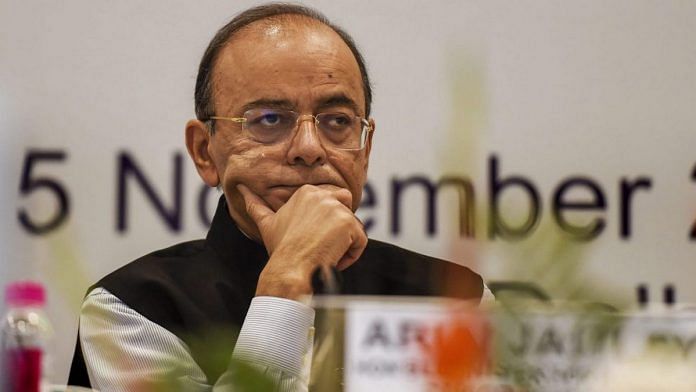Should India have an opaque political funding system, which works only to further the interests of a few cronies and their political patrons? Or, should India move towards a transparent system where people have a right to know who is funding a political party and what they get in return?
These questions are at the heart of the debate on electoral bonds.
A couple of days ago, Prime Minister Narendra Modi was delivering his familiar fusillade of falsehoods while addressing a rally in Arunachal Pradesh. The same day, authorities seized Rs 1.80 crore in cash from the son of a BJP candidate, and a former MLA in the state.
On Sunday, finance minister Arun Jaitley, as is his wont, wrote a blog trying to defend the opaque electoral bonds scheme that his government brought in, ostensibly as a tool to fight corruption. Before we delve deeper, it is pertinent to mention that the Election Commission of India, in an affidavit filed in the Supreme Court, stated that electoral bonds had made political funding opaque and would have “serious repercussions on transparency of political funding” owing to its anonymous nature.
Also read: BJP government was not wise in pushing through electoral bond scheme
Former chief election commissioner S.Y. Quraishi is of the opinion that electoral bonds have legalised crony capitalism. Previously, he has argued that electoral bonds will kill whatever little transparency exists.
Jaitley displays intellectual dishonesty and performs mental gymnastics by presenting us a false narrative. He assumes Indians are gullible.
When electoral bonds were introduced, I spoke out against them in Parliament and have argued in ThePrint as well that the electoral bonds scheme is a regressive measure that fails the clean money, transparency, and fairness tests.
Individuals, corporates, and other entities should be free to support parties and candidates with legal, tax-paid funds. Such donations should be transparent and there should be a level-playing field across parties. The public has the right to know who contributed how much to whom, in order to assess how donations affected policy outcomes.
Electoral bonds can be donated to parties anonymously. The purported logic is that this will shield donors from retribution at the hands of parties they did not support and also incentivise donors to contribute more. However, anonymity works against transparency, as the public cannot follow the money.
It enables the ruling Bharatiya Janata Party (BJP) to claim that it is not corrupt when, in reality, it is squeezing funds out of different groups and people through whatever means necessary.
Only the State Bank of India and the Reserve Bank of India will know who purchased bonds. In the Indian context, this means that the party in power can access information from the State Bank of India about who purchased electoral bonds and then coerce donors by misusing state machinery to add to the lion’s share of corporate donations it currently receives. Electoral bonds thus fail the level-playing field test.
Also read: Congress manifesto promises to scrap electoral bonds, amend anti-defection laws
To give you the sense of the problem, 95 per cent of the electoral bond donations were made to the BJP. Further, data analysis from July last year revealed that there was hardly any demand for electoral bonds of lower denominations. During July 2018, “not a single electoral bond was purchased in the denomination of Rs 1,000 and Rs 10,000. In terms of the value of bonds purchased, 99.7 per cent were in the denomination of Rs 10 lakh & Rs 1 crore.”
The logical conclusion that can be drawn is: a few extremely rich people/entities have been donating through the electoral bonds and, in almost all cases, it is the BJP, which benefits from the largesse.
This raises important questions: Why is it that the BJP bags the majority of the donations? Why is it that high denomination electoral bonds find favour? Who are the people/entities donating large sums to the BJP?
The five years of the Modi government witnessed numerous policy changes that are known to have benefitted a select few business people. PSUs were bled dry to unjustly enrich some business houses. With electoral bonds, these entities can pay back in kind and the people of this country would have no way to know what transpired.
Anonymity is anti-thesis of transparency. Finance minister Jaitley tries to mislead us by diverting attention to electoral trusts, an instrument the UPA introduced. However, this is a red herring. The public could see which electoral trust donated to whom.
Also read: Electoral bonds worth Rs 1,716 cr issued this year — it’s Rs 660 cr more than all of 2018
The blog also tries to subtly hide behind the oft-repeated idea of all cash being black. On that note, Arun Jaitley must answer as to how is it that despite the demonetisation that he presided over, the BJP leaders are caught with large quantities of cash on the day the Prime Minister is visiting the state. To what purpose was the cash being put to use? The same demonetisation disaster also showed us how easily the banking system could be used to convert cash or black money into white. Thus, electoral bonds just become a way for the BJP to launder money, which is why Jaitley rises to their defence.
Coming back to the important question, the Congress party is committed to free and fair elections and transparency. We will scrap the opaque Electoral Bond Scheme. We will also set up a National Election Fund to provide for public funding of elections. Funds will be allocated at the time of elections to recognised political parties in accordance with criteria laid down by law. Our agenda for electoral reform will set India on the path to a cleaner, corruption-free political system.
The author is a Congress MP and Chairman, AICC Research Department. He has written on public funding of elections in his personal capacity before.



